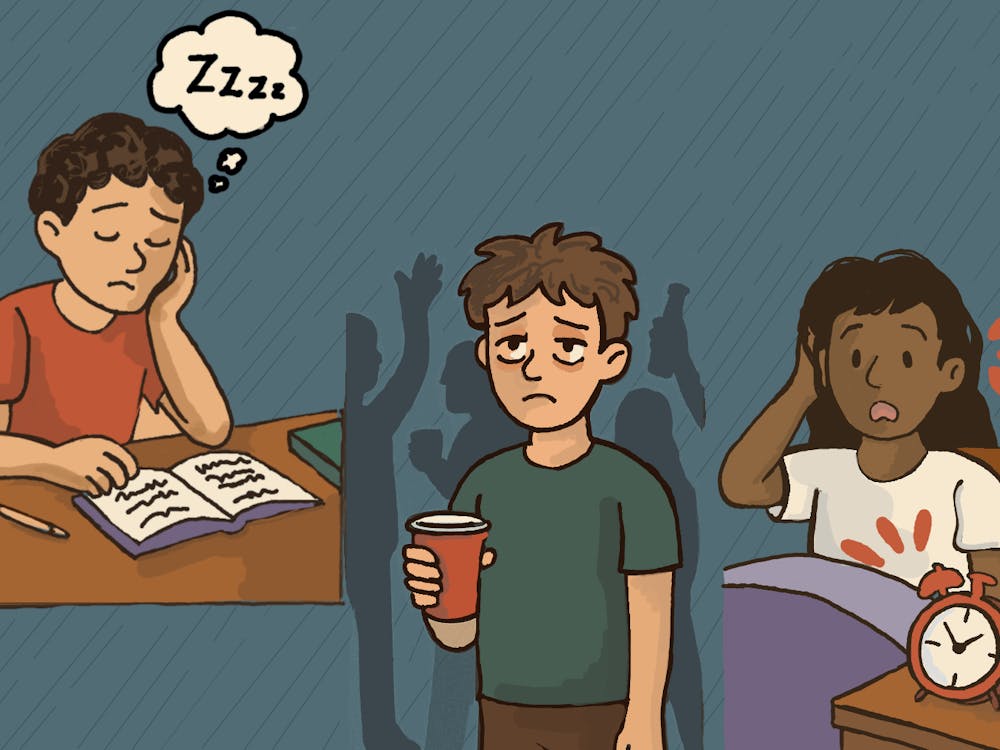Never have I fallen in love as quickly or deeply as I did the first day I stepped foot into Arabic 1010. From my first “marhaban” — “hello” in Arabic — I was hooked, and time only strengthened my feelings. Week by week, I began to appreciate its little quirks, trace its alphabet’s sleek curves, and feel ignited within me an unquenchable desire to know the language inside and out. Love is a rollercoaster, and my affair with Arabic is no exception — but the highs of the ride make me want to get in line again and again.
When learning a language, I particularly love finding words in the new language that describe feelings or ideas that don’t have a corresponding one-word descriptor in English. A few examples that hit close to home include “saudade,” a Portuguese term describing a vague, constant desire for something that does not and probably cannot exist as well as “vacilando,” a Spanish verb used to describe traveling when the experience itself is more important than the destination (ask me about my accidental 48-hour trip to Memphis, Nashville, Austin and Orlando earlier this year). But in my mind, none top my personal favorite, a Norwegian noun — “forelsket.” What does it mean? Well, simply put, it is the indescribable euphoria experienced as you begin to fall in love.
While we do not have a perfect translation for this word in English, we do have some close cousins. Take the idea of the honeymoon phase, for example — the deep infatuation implied by the phrase certainly echoes the “indescribable euphoria” that forelsket describes. But regardless of whether or not there is an exact English equivalent, forelsket is a feeling that I believe many of us have had the privilege of experiencing, and that is pretty special.
Looking more closely at the translation of this Norwegian nugget of linguistic genius, I am especially fascinated by its conclusion. Instead of “as you begin to fall in love,” the wording could have just as easily been “as you begin to love someone.” Yet somehow, because of that slight difference between using “love” and “in love,” the implication is so much heavier, so much deeper. Those few words mean everything.
If you sit and toy with that idea for a moment, the importance of minute differences in language within the broader romantic sphere becomes abundantly clear. “Seeing each other” implies something separate from “dating,” which differs from being “in a relationship” or “hanging out” or whatever else the kids are calling it these days.
To make things even more complicated, everyone has his or her own individual interpretation of each of these terms. This means that, despite our shared dictionary, we are likely just as lost when a friend tells us that he or she is “seeing someone” as we would be if the same friend came up and announced they had finally forelsket-ed with their partner(s).
As frustrating as it can be to try to decipher the intricate meanings buried within a single word or two, there is also a unique beauty in language’s ability to not only elucidate but also obfuscate meaning. Perhaps the term that best exemplifies this on a college campus is “hooking up” — seriously, what does that even mean?
I’ve heard the colloquialism used to describe everything from a chance encounter under the mistletoe to some situations I certainly wouldn’t want my grandma to hear about. But while the lack of clarity may be annoying from a listener’s perspective, it may well be the exact intent of the speaker. Isn’t language fun?
Of course, I would not be doing this topic justice if I didn’t discuss the word “love” itself — it’s everywhere. We use it to describe our feelings about things, ideas, places and people every day, often times without giving it a second thought. I have had my ubiquitous use of the word challenged on many occasions, especially by concerned citizens who worry that its commonness leads to a deterioration of its meaning.
After all, they say — if I claim to love anything from Frisbee (I do) to cheese (it’s true), does that not make my love for a person less special? And, perhaps more crucially, if I tell two people that I love them, doesn’t that make each statement mean less? (I’m looking at you, Ben Higgins.)
How do I put this? Um … No.
Absolutely not.
Love is hardly a scarce commodity — rather, it’s the most plentiful good in the universe. If you wanted, you could love everyone and everything, truly and deeply. Of course, time and energy are not unlimited, so the expression of said love could not be endless, but the feeling itself can be.
The best example of this is the opening scene from my favorite movie, “Love Actually.” The film begins at London-Heathrow, where family and friends anxiously await the arrival of loved ones. As the ever-wonderful Hugh Grant narrates, “It seems to me that love is everywhere. Often, it's not particularly dignified or newsworthy, but it's always there — fathers and sons, mothers and daughters, husbands and wives, boyfriends, girlfriends, old friends … If you look for it, I've got a sneaky feeling you'll find that love actually is all around.”
Love truly is everywhere — whether we are lucky enough to experience all of its different forms or not — and each type’s existence does nothing to demean the value of another. The same is true within each (arguably artificial) category as well — after all, having two siblings does not automatically imply that you love each less than you would if you only had one. The same goes for friends, parents and any other type of love as well. That’s because even though love has such a broad basis for use, that one word captures such an individual feeling with each utterance.
Thankfully, the word alone doesn’t have to do all the heavy lifting of conveying our full meaning. It is aided not only by the other words surrounding it, but also by our tone, body language, timing, setting and an almost endless list of other factors.
Recognizing these key influences, the word love is therefore not an overused exaggeration, but rather a term with a clearly individual meaning completely driven by the context of the specific relationship it describes. Done right, then, an “I love you” should tell someone that their love is unlike any other in the world, though others certainly do exist.
Therefore, though English may lack exact words to describe specific feelings, the beauty of language is that you can convey the same meaning in any tongue — some just may be more efficient than others. However, if you’re worried that English just won’t cut it the next time you need to confess your love, Arabic has some fantastic vocabulary you can use — just say, “Uhibik ya dajaj.” I promise you they’ll be perfectly confused whether they understand the language or not.







